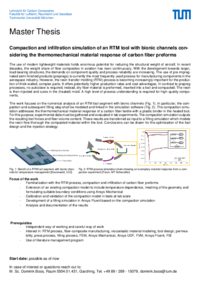Compaction and infiltration simulation of an RTM tool with bionic channels considering the thermomechanical material response of carbon fiber preforms
- Institut
- Lehrstuhl für Carbon Composites (TUM-ED)
- Typ
- Masterarbeit
- Inhalt
- experimentell theoretisch
- Beschreibung
The use of modern lightweight materials holds enormous potential for reducing the structural weight of aircraft. In recent decades, the weight share of fiber composites in aviation has risen continuously. With the development towards larger, load-bearing structures, the demands on component quality and process reliability are increasing. The use of pre-impregnated semi-finished products (prepregs) is currently the most frequently used process for manufacturing components in the aerospace industry. However, the resin transfer molding (RTM) process is becoming increasingly important for the production of thick-walled, complex parts. It offers potentially higher production rates and cost advantages. In contrast to prepreg processes, no autoclave is required; instead, dry fiber material is preformed, inserted into a tool and compacted. The resin is then injected and cures in the (heated) mold. A high level of process understanding is required for high-quality components.
The work focuses on the numerical analysis of an RTM tool segment with bionic channels (Fig. 1). In particular, the compaction and subsequent filling step shall be modeled and linked in the simulation software (Fig. 2). The compaction simulation addresses the thermomechanical material response of a carbon fiber textile with a plastic binder in the heated tool. For this purpose, experimental data must be gathered and evaluated in lab experiments. The compaction simulation outputs the resulting tool forces and fiber volume content. These results are transferred as input to a filling simulation which models the resin flow thorough the compacted material within the tool. Conclusions can be drawn for the optimization of the tool design and the injection strategy.
Focus of the work
- Familiarization with the RTM process, compaction and infiltration of carbon fiber preforms
- Extension of an existing compaction model to include temperature dependence, meshing of the geometry and formulating suitable boundary conditions using Ansys Mechanical
- Calibration and validation of the compaction model in tests at lab scale
- Development of a filling simulation in Ansys Fluent based on the compaction simulation
- Analysis and documentation of the results
- Voraussetzungen
Prerequisites
- Independent way of working and careful way of work
- Interest in: RTM process, fiber-composite manufacturing, viscoelastic material modeling, tool design, permeability, press process, filling process, FEM, Ansys Mechanical, Ansys UDF, FVM, Ansys Fluent, FSI
- Use of literature management program
- Möglicher Beginn
- sofort
- Kontakt
-
M.Sc. Dominik Boos
Raum: MW1431
Tel.: 08928915079
dominik.boostum.de - Ausschreibung
-
